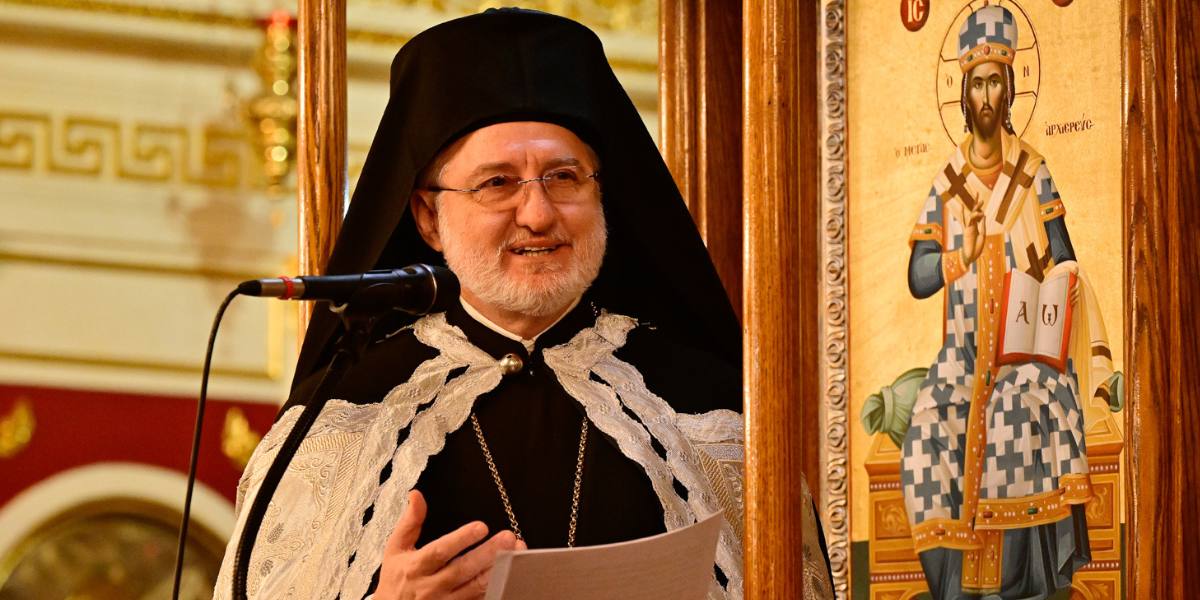His Eminence Archbishop Elpidophoros
Homily for the Third Bridegroom Service
Matins of Great and Holy Wednesday - April 30, 2024
Kimisis tis Theotokou Greek Orthodox Church
Brooklyn, New York
Dear Brothers and Sisters in Christ,
As I have been well pleased in past years, so I am also tonight to be with you, once again, for this Third Bridegroom Service, when we are blessed to hear once again the most beloved Hymn of Kassiani.
But there is another hymn that was chanted this evening, that reveals much about the mystery of our human condition. It was sung at the Αἴνους and begins:
Ὅτε ἡ ἁμαρτωλός, προσέφερε τὸ μύρον, τότε ὁ μαθητής, συνεφώνει τοῖς παρανόμοις·
Just as the Sinful Woman was offering the myrrh, that is when [Judas] made his pact with the lawless ones….
The contrast between the two of them is striking, and is all the more dramatic when you think that the love of the one and the treachery of the other were happening at the same time. It also calls into question how we judge others, for one was an obvious sinner and the other a disciple of the Lord; but their stories end in a reversal of roles: she becomes a beloved follower of the Lord and the other becomes His betrayer.
And so, the hymn continues to paint its picture:
ἡ μὲν ἔχαιρε κενοῦσα τὸ πολύτιμον, ὁ δὲ ἔσπευδε πωλῆσαι τὸν ἀτίμητον,
She rejoiced to utterly expend that which was most precious; and he hastened to sell the One who was priceless…
The nameless Sinful Woman, laden with all her shortcomings and her many sins, is held up as in a mirror against the traitor Judas, whose name we do know, but who forfeited everything that the fellowship of the Twelve Disciples and the embrace of our Lord had given him. She knows no shame as she pours out the precious myrrh, even though everyone in the room is staring in disbelief at her boldness. And Judas shows no shame as he sells the Lord out – the Priceless One for the price of thirty pieces of silver.
And the hymn goes on:
αὕτη τὸν Δεσπότην ἐπεγίνωσκεν, οὗτος τοῦ Δεσπότου ἐχωρίζετο,
She recognized her Master, but he cut himself off from his Master…
Knowing that she needed forgiveness, she comes to a twofold recognition. First, that she needed to repent and beg forgiveness. And second, that the Lord Jesus was the source of that forgivness, as He would manifest from the Cross when He said:
Father, forgive them, for they know not what they do.
But Judas fled from the Lord, cutting himself of from the Source of Life. So much so, that even after sharing in the Mystical Supper in the Upper Room, he deserted the Light of the World to betray Him. The Gospel simply states “that it was night,” referring to the darkness within his heart. And so, the consequences of their actions are revealed:
αὕτη ἠλευθεροῦτο, καὶ ὁ Ἰούδας δοῦλος ἐγεγόνει τοῦ ἐχθροῦ, δεινὸν ἡ ῥαθυμία!
The Woman was liberated, and Judas became the slave of the enemy [Satan] through his terrible impudence.
It is indeed hard to see into the mind of Judas, but there most certainly was an arrogance and impudence in his betrayal that turned him from a disciple of the Lord into a servant of Satan. But the Sinful Woman gained her freedom; she was released from all her sins by her act of love of faith. The Hymnographer concludes the ode with this proclamation:
μεγάλη ἡ μετάνοια! ἥν μοι δώρησαι Σωτήρ, ὁ παθὼν ὑπὲρ ἡμῶν, καὶ σῶσον ἡμᾶς.
How great was her repentance! O Savior, Who suffered for our sake, grant such unto me and save us.
And here, we leave the hymn, praising her metanoia and beseeching the Lord Who spared nothing for our salvation to grant us a heart like hers. This is where we find ourselves emotionally at the conclusion of this magnificent and beautiful service.
My beloved Christians:
The Sinful Woman and Judas are inside every one of us. Whether we know it or not.
True, we may not be the great and notorious sinner like the woman. And we may not have been an utter traitor to our Lord and our Church. But the propensities for both linger within our hearts.
The services and hymns of Holy Week invite us to discover the mystery of our human condition. And by God’s grace, we shall choose the way of repentance over foolish and dangerous impudence.
Thus, with a good heart cleansed from sin, we shall arrive at the glorious Pascha of the Lord. Amen.
Καλή Ἀνάσταση.
Photos: GOARCH/Dimitrios Panagos

